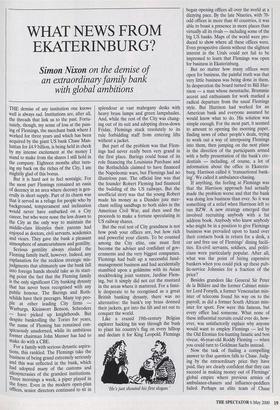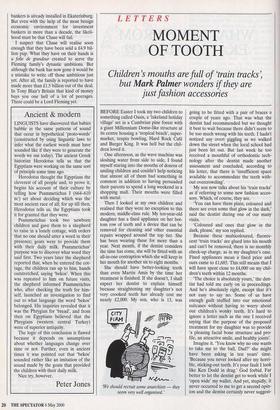WHAT NEWS FROM EKATERINBURG?
Simon Nixon on the demise of
an extraordinary family bank with global ambitions
THE demise of any institution one knows well is always sad. Institutions are, after all, the threads that link us to the past. Fortu- nately, though, my sense of loss at the pass- ing of Flemings, the merchant bank where I worked for three years and which has been acquired by the giant US bank Chase Man- hattan for £4.9 billion, is being held in check by my intense excitement at the money I stand to make from the shares I still hold in the company. Eighteen months after turn- ing my back on the riches of the City, I am mightily glad of this bonus.
But it is hard not to feel nostalgic. For the most part Flemings remained an oasis of decency in an area where decency is gen- erally in short supply. Part of its charm was that it served as a refuge for people who by background, temperament and inclination would never have embarked on a City career, but who were none the less drawn to the City as the only way to maintain the middle-class lifestyles their parents had enjoyed as doctors, civil servants, academics and vicars. They gave the bank a pleasant atmosphere of amateurishness and gentility.
Serious gentility always eluded the Fleming family itself, however. Indeed, any explanation for the reckless strategic mis- judgments that ultimately saw the bank fall into foreign hands should take as its start- ing point the fact that the Fleming family is the only significant City banking dynasty that has never been recognised with any public honour. The Barings and Roth- schilds have their peerages. Many top peo- ple at other leading City firms — Warburgs, Kleinwort Benson, Schroders — have picked up knighthoods. But despite bankrolling the Tories for years, the name of Fleming has remained con- spicuously unadorned, while its ambitious former chairman John Manser has had to make do with a CBE.
For a family with serious dynastic aspira- tions, this rankled. The Flemings take the business of being grand extremely seriously and this was reflected in the bank, which had adopted many of the customs and idiosyncrasies of the grandest institutions. Three mornings a week, a piper played in the foyer. Even in the modern open-plan offices, senior directors continued to sit in splendour at vast mahogany desks with heavy brass lamps and green lampshades. And, while the rest of the City was chang- ing out of its suit and adopting dress-down Friday, Flemings stuck resolutely to its rule forbidding staff from entering lifts without a jacket.
But part of the problem was that Flem- ings had never really been very grand in the first place. Barings could boast of its role financing the Louisiana Purchase and the Rothschilds claimed to have financed the Napoleonic wars, but Flemings had no illustrious past. The official line was that the founder Robert Fleming had financed the building of the US railways. But the unofficial story was that the young Robert made his money as a Dundee jute mer- chant selling sandbags to both sides in the American Civil War, and then used the proceeds to make a fortune speculating in US railway shares; But the real test of City grandness is not how posh your offices are, but how rich and powerful your clients. To be counted among the City elite, one must first become the adviser and confidant of gov- ernments and the very biggest companies. Flemings had built up a successful fund- management business and had accidentally stumbled upon a goldmine with its Asian stockbroking joint venture, Jardine Flem- ing, but it simply did not cut the mustard in the areas where it mattered. For a fami- ly desperate to be recognised as a great British banking dynasty, there was no alternative: the bank's top brass donned their jackets, got into the lift and set out to conquer the world.
Like a crazed 19th-century Belgian explorer hacking his way through the bush to plant his country's flag on every hilltop and declare it for King Leopold, Flemings He's just shouted his first slogan.' began opening offices all over the world at a dizzying pace. By the late Nineties, with 70- odd offices in more than 40 countries, it was able to boast a presence in more places than virtually all its rivals — including some of the big US banks. Maps of the world were pro- duced to show where all these offices were. Even prospective clients without the slightest interest in the Urals could not fail to be impressed to learn that Flemings was open for business in Ekaterinburg.
But no matter how many offices were open for business, the painful truth was that very little business was being done in them. In desperation the board turned to Bill Har- rison — a man whose moustache, Brummie accent and enthusiasm for work marked a radical departure from the usual Flemings style. But Harrison had worked for an American bank and everyone assumed he would know what to do. His solution was simple enough. For the most part, it seemed to amount to opening the morning paper, finding news of other people's deals, trying to work out a way of interposing Flemings into them, then jumping on the next plane in the direction of the participants armed with a hefty presentation of the bank's cre- dentials — including, of course, a lot of information about the office in Ekaterin- burg. Harrison called it 'transactional bank- ing'. We called it ambulance-chasing.
If anything, the feeling at Flemings was that the Harrison approach had actually made the problem worse and that the bank was doing less business than ever. So it was something of a relief when Harrison left to run BZW. A new strategy emerged that involved recruiting anybody with a fat address book. Anybody who knew anybody who might be in a position to give Flemings business was prevailed upon to hand over their contacts book in return for a desk, a car and free use of Flemings' dining facili- ties. Ex-civil servants, soldiers, and politi- cians were particularly popular. After all, what was the point of hiring expensive bankers when you could pick up these pub- lic-service Johnnies for a fraction of the price?
Besides grandees like General Sir Peter de la Billiere and the former Cabinet minis- ter Lord Forsyth, a former Venezuelan min- ister of telecoms found his way on to the payroll, as did a former South African min- ister for sport. Few were this famous, but every office had someone. What none of these influential recruits could ever do, how- ever, was satisfactorily explain why anyone would want to employ Flemings — led by the Old Etonian fox-hunting fanatic and bon viveur, 46-year-old Roddy Fleming — when you could turn to Goldman Sachs instead.
Now the task of finding a compelling answer to that question falls to Chase. Judg- ing by the extraordinary price they have paid, they are clearly confident that they can succeed in making money out of Flemings' global empire where previous armies of ambulance-chasers and influence-peddlers failed. Perhaps an elite team of Chase bankers is already installed in Ekaterinburg. But even with the help of the most benign economic environment for investment bankers in more than a decade, the likeli- hood must be that Chase will fail.
I suspect that Chase will realise soon enough that they have been sold a £4.9 bil- lion pup. What they have on their hands is a folie de grandeur created to serve the Fleming family's dynastic ambitions. But although the bank has now gone it would be a mistake to write off those ambitions just yet. After all, the family is reported to have made more than £1.5 billion out of the deal. In Tony Blair's Britain that kind of money buys you one hell of a lot of peerages. There could be a Lord Fleming yet.



































































 Previous page
Previous page